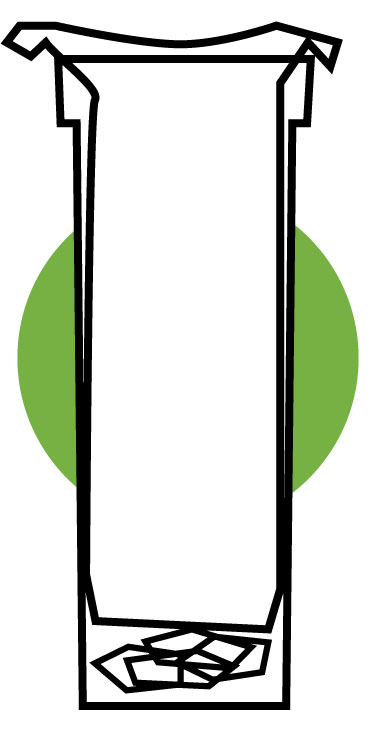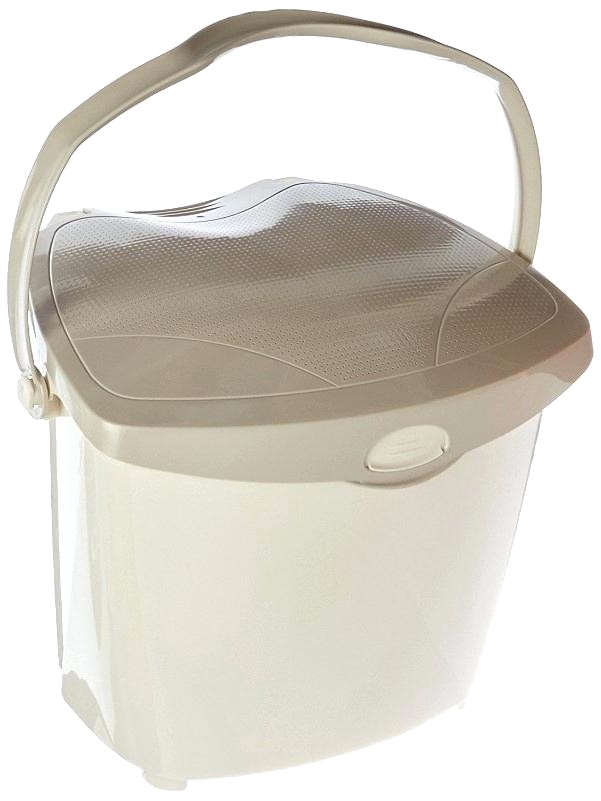Food waste
FOOD IS NOT GARBAGE!
The Green Bin program is a very effective way to reduce the amount of material going to landfill and prevent the loss of a valuable resource: food waste.
THANK YOU FOR YOUR EFFORTS!
Since the implementation of food waste collection in 2009, thousands of metric tons have been diverted from landfills. In 2020 alone, nearly 586 tons of food waste were collected by the City.
The door-to-door green waste collection is done according to 2 distinct collection days (sectors).
The interactive map of the collection sectors allows you to know the collection days for your address.

Raw, cooked or rotten solid food :
- Fruits and vegetables
- Meat and poultry, including bones, skin and entrails
- Fish and seafood, including bones and shells
- Solid dairy products and eggs, including the shells
- Pasta, bread, rice and cereals
- Cakes, biscuits, candies and sweets
- Coffee grounds, filters and tea bags
- Nuts and shells
- Animal food
Other materials:
- Soiled paper and cardboard (food boxes, cardboard dishes, etc.)
- Paper towels, napkins and tissues
- Indoor plants and cuttings
- Cork (natural)
(Please note that garden waste is collected separately by the City)

- Recyclable and non-organic materials
- Liquids (soup, milk, juice, coffee, oils, fats, etc.)
- Hazardous household products
- Plastic, aluminum, styrofoam or waxed packaging
- Elastics and identification stickers
- Wood, ashes and plastic corks
- Chewing gum and cigarette butts
- Disposable clothing, fabric softeners and cleaning products
- Diapers, sanitary products, cotton stems and make-up remover wipes
- Hair, feathers, fur, dead animals, litter and excrement
- Vacuum cleaner bags and their contents
- Oxo-biodegradable or biodegradable bags
- Garden waste (collected separately by the City), soil, stones and sand
CERTIFIED COMPOSTABLE PLASTIC BAGS
Although compostable plastic bags are accepted, their use is not recommended as they take too much time to decompose and eventually have to be removed from the compost at the treatment centre. Using paper bags or wrapping food in newpaper are the recommended options.
Oxo-biodegradable or degradable bags are not compostable. Oxo-biodegradable bags found on the market are made of conventional plastic to which an additive has been added.
Only certified 100% compostable plastic bags with one of the following certification logos are accepted in the green bin:
![]()
DID YOU KNOW?
- Food waste represents about 25% of the contents of a garbage bag
- Burial of food waste contributes to groundwater contamination and to the production of methane, a greenhouse gas 25 times more powerful than CO2
- In addition to being polluting, landfilling is expensive for cities and taxpayers
- The Quebec Residual Materials Management Policy aims to prohibit organic materials in landfills.
- Composting is the process of biological digestion of organic matter. It results from the action of microorganisms breaking down organic matter, such as food residues, in the presence of oxygen. This produces a soil rich in fertilizing compounds: compost.
SINGLE-FAMILY HOMES AND SMALL APARTMENT BUILDINGS

In May 2009, Westmount finished implementing a weekly curbside collection of compostable kitchen waste for single-family homes and small apartment buildings.

STEP 1
Keep your green bin clean and dry by placing a few sheets of newspaper or paper towels at the bottom.

STEP 2
Add a compostable plastic or paper bag inside the bin.

STEP 3
Wrap your food waste in newspaper or place it directly in your green bin.
MULTI-RESIDENTIAL BUILDINGS OF 9 UNITS AND MORE

In 2018, the City of Westmount expanded its composting program to buildings with 9 or more units. The buildings participating in the program have their 2nd weekly garbage collection replaced by a compost collection.
Phase 1 of the expansion program began in July 2018 and involved 20 buildings with a maximum capacity of 70 units located south of De Maisonneuve between Clarke Avenue and Lansdowne Avenue.
Phase 2 of the composting program began in October 2019 and targets buildings between 9 and 30 housing units across the territory.

STEP 1
Add a compostable plastic or paper bag inside your kitchen counter bin.

STEP 2
Wrap your food waste in newspaper or place it directly in your bin.

STEP 3
Tie the bag or fold down the newspaper and transfer the contents into your building’s green bin.
TIPS AND TRICKS
To line your bin, use:
- Absorbent paper or paper bags
- Newspaper, leaflets or cardboard boxes
- Paper food waste bags
- Certified 100% compostable plastic bags with one of the following certification logos
![]()
- Sprinkle baking soda or salt onto your food residues
- Hang your bin 18 inches from the ground
- Keep the bin in a shelter or inside until collection day
- Apply a mentholated ointment around the opening of your bin
- Eliminate white grubs by pouring salt or vinegar on them
Organic materials are mainly composed of water. The most important thing to do to avoid odors is to reduce humidity:
- Wrap your residues in newspaper or cardboard
- Double your bin
- Alternate wet materials (table scraps) and dry materials (paper towels, tissues, etc.)
- Do not pour any liquids in your bin
- Keep your food waste in the refrigerator or freezer the until the collection
- Put out your bin for collection every week, regardless of the amount of waste collected
- Wash your bin with water and a mild detergent
- Sprinkle baking soda in the bottom of your bin
- Kitchen counter bins can be put in the dishwasher
FREQUENTLY ASKED QUESTIONS
Compostable bags for food and garden waste are available at:
- Canadian Tire, Alexis-Nihon Plaza, 1500 Atwater Avenue
- Hogg Hardware, 4833 Sherbrooke Street W.
- Home Depot, 4625 St-Antoine Street W.
- Pharmaprix, 5038 Sherbrooke Street W.
- Pharmaprix, Alexis-Nihon Plaza, 1500 Atwater Avenue
- RONA Le Quincaillier, 2371 Notre-Dame Street W.
- Walmart, 6797 Newman Boulevard
Remember to look for the following certification logos:
![]()
Organic materials are materials that are biodegradable by microorganisms, and therefore compostable. These include food waste, yard waste and other types of waste from industrial and municipal activities.
Table scraps and yard waste are transported and processed in two separate composting centers, so it is important not to mix them. Yard waste, such as plants, lawn clippings, small branches and leaves are collected by a separate collection by City teams. For more details, see the garden waste page here.
Food waste is transported to the Recyclage Notre-Dame composting center where it is mixed with wood chips and placed in swaths. As organic waste degrades, it produces heat. The internal temperature of the swath increases to 70°C, which eliminates pathogens. The composting process takes about six months and the finished product is used as soil fertilizer. Since the residues brought in are minimally sorted, it should be noted that it is very important that the green bin only contains compostable materials.
Due to health and safety concerns for employees who pick up materials, waste placed in the green bin must be packaged in newspaper, paper bag, or compostable plastic bags. It is important not to deposit bulk residues in the bin, as this may create odor and cleanliness problems.
Organic matter is composed mainly of water. In the presence of liquids, anaerobic decomposition of the materials occurs, which can cause odors. The essential thing to do to avoid odors is to limit the humidity in the bin. Wrapping the residues in newspaper before putting them in the green bin is the best solution. You can also store leftovers in the freezer or refrigerator and put them in your bin the day before the collection, especially during hot weather periods.
Participation in the composting program is not mandatory, but is strongly recommended. Collection programs such as the Green Bin and Blue Bin divert waste from landfills and demonstrate the contribution of residents to the health of their city. In addition, the Government of Quebec aims to ban organic materials from landfills within a few years to reduce the amount of waste landfilled.
If you have a composting unit at home, it is not necessary to stop using it. Residents are encouraged to use the green bin for materials that should not be added to the household composter such as meat, fish and dairy products.


